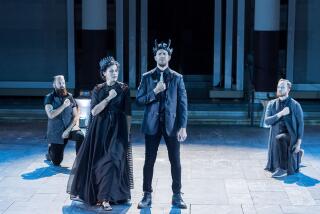The Archeology of Hedonism : THE GOD OF ECSTASY Sex-Roles and the Madness of Dionysos <i> by Arthur Evans (St. Martin’s Press: $19.95; 288 pp., illustrated) </i>
- Share via
Dionysos, the ancient Greek deity of wine and a sort of all-around god of good times, supposedly often manifested himself to mortals in the form of a bowl. Thus Dionysos might be considered the original party animal. But, like Spuds MacKenzie, Dionysos is not nearly as interesting as the women he attracts. Of the innumerable rituals by which different peoples worshiped him, none was more fascinating or fabled than the countryside gatherings to which the Athenian women would biennially steal away. Dionysos’ female devotees were called the bakkhai , and they are the occasion of Arthur Evans’ interest in Dionysos himself.
In this surprisingly readable work, Evans, a San Francisco-based gay activist and writer, examines those rites in particular while tracing the Dionysian tradition in general. “The God of Ecstasy” explores the profound effects Dionysian culture had on civilization through the ages, often serving as a psychic release for those constrained by rigidly defined sex roles created and sustained by society. Evans’ interest in the topic was sparked in the early 1980s, when he translated and ultimately directed his own production of Euripides’ “The Bakkhai,” a staging to which he gave the same title: “The God of Ecstasy.”
In other pantheons, Evans tells us, Dionysos was known as Bakkhos, Eleuthereus, Pan, Sabazios, Innus, Faunus, Minotaur, Priapus, Liber, Ammon, Osiris or Shiva, among other names. Dionysos and Dionysian madness, it seems, were powerfully attractive to pagans of all sexual persuasions.
Euripides’ play concerns a ruse which Dionysos, the illegitimate son of Zeus, concocts in order to bring about the murder of a Theban king by his own mother. The drama can be viewed as a struggle between the two great theisms of the era--the older, peaceful, matriarchal Mycenean tradition and the newer, bellicose behavior typical of the gods populating the Olympian Pantheon. Classical Greek civilization had emerged by the 5th Century BC, and all Mycenean culture had been quashed and supplanted by the new patriarchal order. Over time, fueled by political considerations of the day, this order would ultimately drive the hedonistic worship of Dionysian cult underground, never to surface again until modern times.
Evans claims that the customary relegation of emotional sensitivity and other feminine traits exclusively to females has indirectly resulted in a succession of cultures which have used violence as their principal political and social instruments. He also suggests that the prevalence of male homosexuality in ancient Greece was not, as is sometimes suggested, a reflection of the suppressed status of women there. Indeed he points out that the social respectability of each group tended to wax and wane together. One especially incisive passage takes the long view: “The established concept of how human beings must behave--butch, competitive, violent men dominating passive, feminine women . . . is not necessitated by the order of the cosmos, but is a lopsided and arbitrary re-enforcement of certain human capabilities.”
Eventually Evans follows the Dionysos trail right up to the nuclear age, considering its implications for modern industrial states. But the author is most riveting when he draws numerous, striking parallels between Dionysos and the historical Jesus, deciding that Dionysos has as good a claim to be the Son of God as Jesus ever did, a conclusion certain to offend some readers.
The author relies considerably upon etymological clues. Such techniques can be vital to the study of ancient history, since semantic connections between languages can often fill in the gaps which are inevitably left in the archeological record. Nevertheless, Evans maintains a lucid style that is rarely found in work so heavily reliant on scholarly sources.
The inclusion of Evans’ entire translation of “The Bakkhai” will be many readers’ first exposure to ancient Greek theater. This art form may never again draw an audience of 17,000, as the works of Athenian playwrights occasionally did, but it is a genre which displays more sophisticated character development than is seen in much drama written two millennia later. With its austere sets, minimal casting, and sweeping themes, it poses the great questions of human existence.
“The Bakkhai,” or “The Women Possessed by Bakkhos,” is an engaging play whose plot is rich with irony. For his “God of Ecstasy” production, Evans introduced modern costuming and somewhat updated dialogue, but otherwise his gay production played Euripides straight in 1984. His translation is a trade-off, of course: By explaining the play’s language, making it less obscure, he lost much of the rhythmic beauty of the Greek. Compare Evans’ stilted, too explicit translation of a declaration by Dionysos, where the wine god hints of the doomed Pentheus’ fate (“Your name resembles Penthos , Greek for grief , / And fits you well for your misfortune”) with the corresponding couplet from a translation that was popular a couple of generations ago: “So let it be / a name fore-written to calamity!”
With nearly a third of its 288 pages comprising an appendix containing extensive bibliographical data and the Evans translation, this examination of Dionysian culture is as brief as it is engrossing. A jacket blurb implies that St. Martin’s doesn’t regard the general nonfiction reading public to be a potential market for “The God of Ecstasy”; instead, they are targeting “classical scholars, feminist theoreticians and historians of gay culture.” But to do that is to sell Evans’ work short: Anyone who occasionally ponders the rigidity of his or her own sex role or is just curious about the history of hedonism should find Evans’ trenchant analysis of a difficult subject enlightening.
More to Read
The biggest entertainment stories
Get our big stories about Hollywood, film, television, music, arts, culture and more right in your inbox as soon as they publish.
You may occasionally receive promotional content from the Los Angeles Times.










